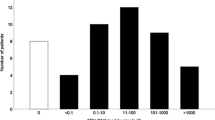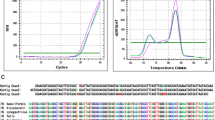Abstract
We have analysed 174 gastric carcinomas from the United Kingdom and from Japan for the presence of Epstein-Barr virus (EBV) using in situ hybridisation for the small EBV-encoded nuclear RNAs (EBERs). EBV was detected in the tumour cells in all of six undifferentiated gastric carcinomas with prominent lymphoid stroma (undifferentiated carcinomas of nasopharyngeal type, UCNT) but only in three of the remaining 168 typical gastric adenocarcinomas (1.8%). No differences were observed between the British and the Japanese cases. One case with an EBV-positive UCNT showed adjacent areas of EBV-negative typical adenocarcinoma. It is uncertain whether these patterns represent two independent carcinomas or whether they are the result of heterogeneous EBV infection in a single tumour. In the remaining EBV-positive carcinomas, viral transcripts were detected in virtually all tumour cells, indicating that EBV infection must have taken place early in the neoplastic process and suggesting that the virus is likely to be of pathogenetic significance for the virus-associated tumours. Immunohistology demonstrated absence of detectable levels of the EBV-encoded latent membrane protein, LMP1, and nuclear antigen, EBNA2. The BZLF1 protein which induces the switch from latent to lytic infection was demonstrated in a small proportion of the tumour cells in three cases. The close association of EBV with undifferentiated gastric carcinomas compared to the variable association with gastric adenocarcinomas suggests fundamentally different roles for the virus in the aetiology of these two malignancies.
This is a preview of subscription content, access via your institution
Access options
Subscribe to this journal
Receive 24 print issues and online access
$259.00 per year
only $10.79 per issue
Buy this article
- Purchase on Springer Link
- Instant access to full article PDF
Prices may be subject to local taxes which are calculated during checkout
Similar content being viewed by others
Author information
Authors and Affiliations
Rights and permissions
About this article
Cite this article
Rowlands, D., Ito, M., Mangham, D. et al. Epstein-Barr virus and carcinomas: rare association of the virus with gastric adenocarcinomas. Br J Cancer 68, 1014–1019 (1993). https://doi.org/10.1038/bjc.1993.472
Issue Date:
DOI: https://doi.org/10.1038/bjc.1993.472
This article is cited by
-
Association between Epstein-Barr virus infection and gastric cancer: a systematic review and meta-analysis
BMC Cancer (2020)
-
Gastric cancer: genome damaged by bugs
Oncogene (2020)
-
A case of poorly differentiated adenocarcinoma with lymphoid stroma originated in the ascending colon diagnosed as lymphoepithelioma-like carcinoma
Clinical Journal of Gastroenterology (2020)
-
Epstein–Barr virus gene expression in human breast cancer: protagonist or passenger?
British Journal of Cancer (2003)
-
Epstein–Barr virus and oncogenesis: from latent genes to tumours
Oncogene (2003)



